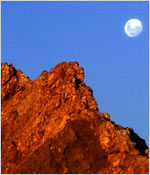|
|
| Help | |
| You are here: Rediff Home » India » Get Ahead » Leisure » Travel |
|
 The moon seen over a mountain at the Atacama Desert, Chile. | |||||
| Related Articles | |||||
|
•
India's top wildlife safaris
| |||||
| |||||||||||||||||||||||
|
| |||||||||||||||||||||||
Book a stay at the New Mexico Skies inn, high in the Sacramento Mountains, and you'll encounter some unusual rules. You'll need to check in before sundown and not drive out after dark. White lights -- like conventional flashlights -- aren't allowed. And you'll have to go without daily housekeeping services; vacuuming and dusting might disturb other guests' daytime sleep. At this secluded mountain hideaway dedicated to the pursuit of amateur astronomy, every measure is taken to protect the property's most treasured commodity: darkness.
With its high altitude, arid climate, and low population density (which translates to minimal light pollution), New Mexico offers some of the clearest nighttime views of the stars, moon, and planets. But it's just one of many destinations around the world that cater to celestial enthusiasts -- and where the nighttime views rival those in the daytime.
In Pictures: World's top 10 stargazing spots
- Also see: World's Most Amazing Bridges
Many of these destinations -- like Hawaii, northern Chile, and Sweden -- offer the same optimal, high-and-dry viewing conditions as New Mexico does. But surprisingly, even America's second-largest (and perhaps smoggiest) city, Los Angeles, is a Mecca for astronomy buffs. The reason: the city's iconic Griffith Observatory, with its 12-inch refracting telescope that's powerful enough to look past the glare of terrestrial lights and pollution.
"It really doesn't affect viewing the most impressive objects in the sky -- the sun, the moon, and bright planets like Venus, Jupiter, and Mars [Images]," says Tony Cook, the astronomical observer for Griffith Observatory. Cook and other staffers run a variety of public programs at the observatory, including planetarium shows and monthly "star parties," with guided viewing through telescopes set on the observatory lawns.
Of course, to see more nebulous, far-flung heavenly bodies, like distant star clusters or galaxies, getting away from the big city is key. As well as heading to New Mexico Skies, where guests can book private observation domes, more serious astronomy enthusiasts go to remote places like Kiruna, Sweden (just an asteroid's throw from the Esrange Space Center, and offering prime views of the spectacular northern lights). Some partake in astronomy tours, like Smithsonian Journeys' Galileo-themed trips to northern Italy [Images]; still others attend astronomy lectures and stargaze from the decks of a Cunard luxury liner.
In Pictures: World's top 10 stargazing spots
- Also see: World's Best Treehouse Hotels
- Also see: Top 10 Hotel Swimming Pool Views
However they choose to experience it, astronomy can easily become addictive for some travelers. "Our guests come here from all over the world," says Lynn Rice, co-owner of New Mexico Skies. "Some of them had their first serious stargazing experience with us, and now they're running their own astronomy Web sites."
Astronomer David Aguilar, leader of the Smithsonian Journeys' Galileo tour, agrees that astronomical thrills are hard to beat. During his tour, he says, "We'll stand exactly where Galileo stood, with an instrument identical to his" -- re-creating the moment, 400-odd years ago, when the astronomer first used a refracting telescope.
In that moment, Aguilar says, Galileo did more than just see objects that had never been seen before. "He opened up the frontiers of space and time and our true place in them."
In Pictures: World's top 10 stargazing spots
- Also see: World's Best New Hotels of 2008
|
|
| © 2008 Rediff.com India Limited. All Rights Reserved. Disclaimer | Feedback |